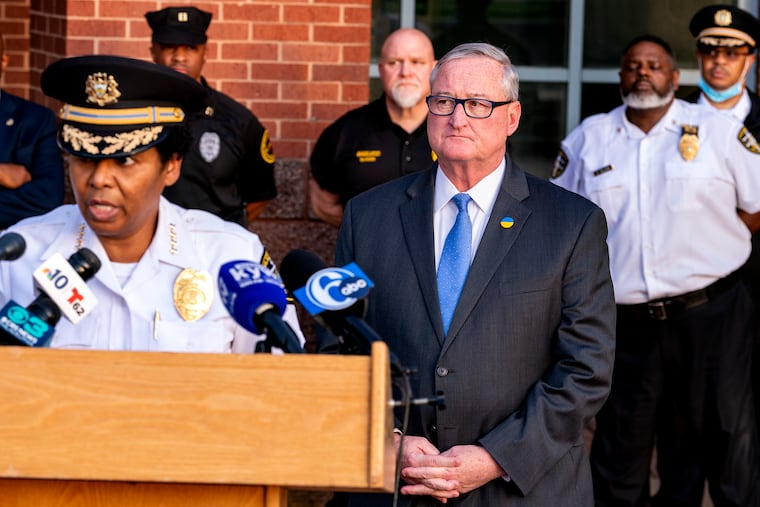Philadelphia’s prisons are in crisis. Mayor and Council need to act. | Editorial
The prison system has been flailing and failing for years, but problems have festered under Commissioner Blanche Carney's leadership.

When Ameen Hurst and Nasir Grant escaped from the Philadelphia Industrial Correctional Center in May, there were no perimeter guards to stop them, no armed staff at a gate to a back road, and the men had a 19-hour head start before prison officials realized they were missing.
Thanks to the work of the U.S. Marshals, both were apprehended within a week. Four others were charged with helping the fugitives escape and evade capture, but the most critical indictment produced by the ordeal is that of a system that’s been breaking down for years.
Once City Council is back in session, it is essential that Mayor Jim Kenney and Council members act to resolve the crisis in Philadelphia prisons, including by instituting independent civilian oversight with the power to act and solve problems.
As Sara Jacobson, executive director of the Public Defender Association of Pennsylvania, wrote in The Inquirer last year, the system is in a health and safety crisis, and the current Prison Advisory Board is “a farce.”
» READ MORE: In Philly prisons, a crisis marked by violence and dismal conditions is worsened by inaction | Editorial
Jacobson, who resigned from the board in 2022 after six years, recounted a litany of problems with the system, the most serious of which are at least 29 deaths in Philadelphia prisons since 2020. She also cited a whistleblower complaint from a Department of Prisons lieutenant that alleged human rights abuses, and corrections officers protesting dangerous working conditions.
Shortly before Hurst and Grant escaped in May, the union representing correctional officers unanimously voted “no confidence” in Prisons Commissioner Blanche Carney. David Robinson, the union’s president, bluntly told The Inquirer, “This is an emergency. The chaos in the prisons, it’s gone too far. None of us feels safe.”
Yet it would be hard to tell there’s an emergency when looking at the actions of the Kenney administration or City Council. Rather than getting tough on Carney, Council honored her earlier this year. After the no-confidence vote, a Kenney spokesperson reiterated the mayor’s “confidence and support.”
As for prison officials, they are blaming overcrowding because of increased lengths of stay.
According to prison system data, pretrial length of stay has increased for prisoners across the board, with one Asian woman, who has been charged with murder, imprisoned for over 1,000 days. At an advisory board meeting, the courts, the District Attorney’s Office, and the public defenders association were all urged to move more quickly to reduce overcrowding and make the job of operating the prisons more manageable.
Certainly, the pandemic exacerbated existing issues, and the court system must move swiftly and do a better job in guaranteeing defendants their right to a speedy trial, but a sluggish calendar only accounts for so much.
After all, it was not too long ago that Philadelphia prisons routinely housed more than 8,000 people. The work of District Attorney Larry Krasner, who ran on a platform of criminal justice reform, has brought the prison census down to just over 4,000. And, as former Councilmember Allan Domb has pointed out, this population reduction has not led to any reduction in costs. In what seems to be a feature of the Kenney administration, the city is doing less with more.
Given the scale of violent crime in Philadelphia, it would be difficult to further reduce the city’s prison population in a safe manner. Those accused of murder, for example, cannot be released per Pennsylvania state law. Others who are detained might be accused of sexual assault, attempted murder, domestic violence, or illegal gun possession with significant prior convictions or arrests. They could also have a detainer in another state, meaning they can’t be released without resolving their charges elsewhere. Additionally, some cases are delayed because of continuances and postponements filed by defense lawyers.
» READ MORE: Compassion is hard to come by in Pennsylvania’s broken prison system. | Editorial
Instead of looking elsewhere for blame, prison officials should look inward. After all, it isn’t the judges’ or lawyers’ fault that the prison system is dangerously understaffed, that parts of the Philadelphia Industrial Correctional Center have doors that don’t lock, or that physical conditions have become “shockingly inhumane.” That’s on the prison system itself.
Nor can leaders plead poverty of resources. Taxpayers are funding a system that spends more per prisoner now than it did a decade ago, with worse results.
City Council should support recent legislation by Councilmember Isaiah Thomas that would create a new independent Prison Oversight Board and Office of Prison Oversight. The nine-member body would be empowered to hire investigators and address issues as they are discovered. If passed and signed by the mayor, the measure would require voter approval to amend the City Charter.
While that change can help fix conditions in the long term, there is more that can be done sooner. Kenney and Council should set a realistic, achievable deadline for Carney to address the problems that have festered under her leadership. If she is unable to adequately resolve the issues, she should be removed.
Without major change, the crisis in our prisons will only get worse.